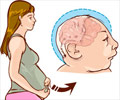A study has shown that congenital defects are seen in children whose mothers have had a kidney transplant and have taken an immunosuppressant drug.
A study has shown that congenital defects are seen in children whose mothers have had a kidney transplant and have taken an immunosuppressant drug, called mycophenolate mofetil (MMF).
The findings of the study have suggested that MMF, commercially available as Cellcept, has potentially harmful effects on the foetus and may result in defects like cleft lip and palate, as well as defects of the jaw, eyes and ears, and no external ear canals.However, the foetal side-effects of several immunosuppressant drugs have been studied, though not for widely used newer medications, such as (MMF).
Immunosuppressant drugs are essential for life-long treatment for solid organ transplant recipients. They are used to prevent, inhibit or reduce the natural reaction of the immune system against foreign tissues. But they have important side effects that sometimes result in ruling out their use. Immunosupressants are also given to women with severe autoimmune diseases, such as generalized lupus.
The FDA has dvided immunosuppressants into four categories (A, B, C and D) based on toxicity to the foetus. MMF has recently been upgraded to class D during pregnancy, imlying that its use is prohibited for the high risk of foetal malformations.
The study led by Dr. Antonio Perez-Aytes and Dr. Maximo Vento of the Newborn Research Unit at the Hospital Universitario Materno-Infantil La Fe, in Valencia, Spain, described a 25-year-old Spanish woman who had undergone two kidney transplants.
She took the immunosuppressant drugs tacrolimus and MMF after the second transplant. She became pregnant two years later and MMF was discontinued at 10 weeks gestation, while tacrolimus, one of the drugs that has been studied in pregnant women, was maintained.
Advertisement
A similar pattern of defects was seen in previous reports of birth defects in infants who were exposed to MMF in utero. This study described these infants, noting that the pattern of cleft lip/palate and ear malformations was seen in every case but one. Though, such defects of the eye had not been seen in humans before, studies in rats and rabbits have shown ocular malformations following exposure to MMF.
Advertisement
However, othe study pointed out that if a transplant recipient is of fertile age, she can give birth to a healthy baby.
“The patient needs to be adequately counseled, and withdraw from immunosuppressants that may be deleterious to the baby within sufficient of becoming pregnant to avoid any interference during the first 12 weeks of gestation,” said Dr. Maximo Vento.
The study was published in the recent issue of the American Journal of Medical Genetics.
Source-ANI
KAV/L










